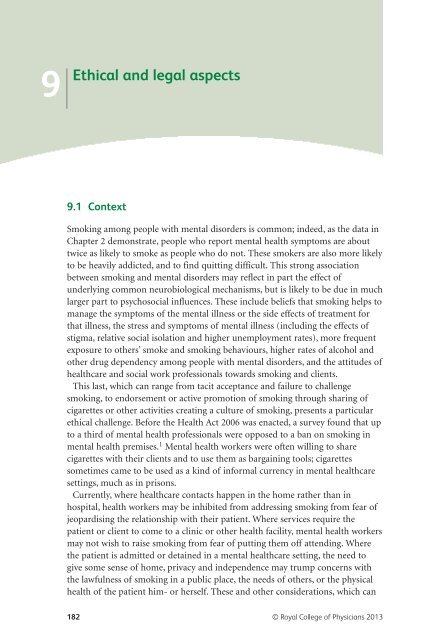Smoking and mental health - NCSCT
Smoking and mental health - NCSCT
Smoking and mental health - NCSCT
You also want an ePaper? Increase the reach of your titles
YUMPU automatically turns print PDFs into web optimized ePapers that Google loves.
9<br />
Ethical <strong>and</strong> legal aspects<br />
9.1 Context<br />
<strong>Smoking</strong> among people with <strong>mental</strong> disorders is common; indeed, as the data in<br />
Chapter 2 demonstrate, people who report <strong>mental</strong> <strong>health</strong> symptoms are about<br />
twice as likely to smoke as people who do not. These smokers are also more likely<br />
to be heavily addicted, <strong>and</strong> to find quitting difficult. This strong association<br />
between smoking <strong>and</strong> <strong>mental</strong> disorders may reflect in part the effect of<br />
underlying common neurobiological mechanisms, but is likely to be due in much<br />
larger part to psychosocial influences. These include beliefs that smoking helps to<br />
manage the symptoms of the <strong>mental</strong> illness or the side effects of treatment for<br />
that illness, the stress <strong>and</strong> symptoms of <strong>mental</strong> illness (including the effects of<br />
stigma, relative social isolation <strong>and</strong> higher unemployment rates), more frequent<br />
exposure to others’ smoke <strong>and</strong> smoking behaviours, higher rates of alcohol <strong>and</strong><br />
other drug dependency among people with <strong>mental</strong> disorders, <strong>and</strong> the attitudes of<br />
<strong>health</strong>care <strong>and</strong> social work professionals towards smoking <strong>and</strong> clients.<br />
This last, which can range from tacit acceptance <strong>and</strong> failure to challenge<br />
smoking, to endorsement or active promotion of smoking through sharing of<br />
cigarettes or other activities creating a culture of smoking, presents a particular<br />
ethical challenge. Before the Health Act 2006 was enacted, a survey found that up<br />
to a third of <strong>mental</strong> <strong>health</strong> professionals were opposed to a ban on smoking in<br />
<strong>mental</strong> <strong>health</strong> premises. 1 Mental <strong>health</strong> workers were often willing to share<br />
cigarettes with their clients <strong>and</strong> to use them as bargaining tools; cigarettes<br />
sometimes came to be used as a kind of informal currency in <strong>mental</strong> <strong>health</strong>care<br />
settings, much as in prisons.<br />
Currently, where <strong>health</strong>care contacts happen in the home rather than in<br />
hospital, <strong>health</strong> workers may be inhibited from addressing smoking from fear of<br />
jeopardising the relationship with their patient. Where services require the<br />
patient or client to come to a clinic or other <strong>health</strong> facility, <strong>mental</strong> <strong>health</strong> workers<br />
may not wish to raise smoking from fear of putting them off attending. Where<br />
the patient is admitted or detained in a <strong>mental</strong> <strong>health</strong>care setting, the need to<br />
give some sense of home, privacy <strong>and</strong> independence may trump concerns with<br />
the lawfulness of smoking in a public place, the needs of others, or the physical<br />
<strong>health</strong> of the patient him- or herself. These <strong>and</strong> other considerations, which can<br />
182 © Royal College of Physicians 2013














